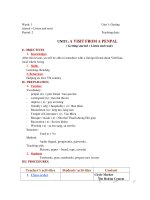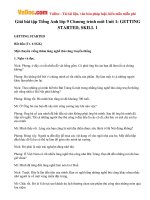Unit 1 the generation gap lesson 1 getting started
Bạn đang xem bản rút gọn của tài liệu. Xem và tải ngay bản đầy đủ của tài liệu tại đây (1.54 MB, 22 trang )
WELCOME TO
OUR CLASS
Ms. Thủy Tiên
ANSWER THE QUESTIONS
1/ How many people are there in your family ?
2/ Who are they ?
3/ Have you ever been angry by your family ?
4/ Do you like living with them ?
UNIT 1 :
THE GENERATION GAP
Lesson 1:GETTING STARTED
OUR FAMILIES
Activity 1 : Listen and read
Sam:
Do you visit your grandparents every weekend?
Ann:
Well, just my mom's parents, but I don't need to visit my other grandparents. You see, I live in a big house with my dad's parents and my uncle's family.
Sam:
I see. You're part of an extended family then. You certainly have more fun than me. I live in a nuclear family with just my parents and my younger brother.
Ann:
That's right. I think my parents are luckier than others because they don't have to worry about childcare. My sister and I also learn a lot of skills from my grandmother.
Sam:
So, are there any problems between the generations in your family?
Ann:
You mean a generation gap? Well, there are. My grandma has her own beliefs about things like hairstyles, appearance and table manners. She thinks women must do all the housework while my parents
believe family members should share the chores.
Sam:
What about your grandpa?
Ann:
He's the most conservative person in my family. He thinks that I ought to get a job in a state-owned organization after university. He says I should follow in his footsteps.
Sam:
Oh, really? Do your parents share his viewpoints?
Ann:
No, they don't. My parents are more open-minded. They just give us advice, but they never try to impose their decisions on us.
Sam.
You mean there's no generation gap between you and your parents?
Ann:
Well, sometimes conflicts do happen, but we sit together and discuss. We all think we need to understand each other better.
Sam:
Lucky you! You must be so happy to have such a great relationship with your parents!
Ann:
Thank you!
extended family (n)
/ɪkˌstendɪd ˈfæməli/
A big family that includes not only the parents and children, but also grandparents, uncles, aunts and cousins, all living under the same
roof.
- nuclear family (n)
A family that consists of parents and children.
/ˌnjuːkliə ˈfæməli/
- childcare (n)
/ˈtʃaɪldkeə(r)/
the care of children, especially while parents are at work
- the generation gap (n)
/ðə ˌdʒenəˈreɪʃn ɡæp/
The difference in attitudes or behaviors between younger and older age groups, which can cause a lack of
understanding.
- table manners (n)
/ˈteɪbl mænəz/
The rules of behavior that are typically
accepted while people are eating at the
table.
- viewpoint (n)
/ˈvjuːpɔɪnt/
A person's opinion about the subjects.
- conservative (a) /kənˈsɜː.və.tɪv/
not usually liking or trusting change, especially sudden change
3. Match each phrase on the left with its definition on the right.
Words
Definitions
A. A big family that includes not only the parents and children, but also grandparents, uncles, aunts and cousins,
1. Extended family
all living under the same roof.
2. Generation gap
B. A family that consists of parents and children.
C. The difference in attitudes or behaviors between younger and older age groups, which can cause a lack of
3. Nuclear family
understanding.
4. Extracurricular
D. The rules of behavior that are typically accepted while people are eating at the table.
activity
5. Viewpoint
E. An activity that can be done by students but not a part of school or college course.
6. Table manners
F. A person's opinion about the subjects.
KEYS :
1.A
2.C
3.B
4.E
5.F
6.D
Activity 2. Read the conversation again. Are the following sentences true (T) or false (F)
1. Sam is part of an nuclear family.
T
2. Ann is part of a extended family.
T
T
3. Ann's grandparents look after their grandchildren.
don’t have
4. Ann's grandma and her parents have the same belief about housework.
the same
5. Ann's parents let her make decisions
T
F
4. Find other compound nouns in the conversation. Use a dictionary to look up their meanings, if necessary.
grandparents, grandma, grandpa, grandmother, hairstyles, housework, footsteps
5. Read the conversation again and find verbs used to express duty, obligation, advice, or lack of obligation.
•
•
•
Opinion & advice: should and ought to in positive and negative forms.
Duty & obligation: must and have to.
Lack of obligation: (not)have to,(not) need to
6. Ask and answer the following questions.
1. Are you part of a nuclear or an extended family?
I am part of a nuclear / an extended family.
2. What do you like and dislike about your type of family? Why ?
Read and choose the headline “cons”or “pros” for each group following.
Nuclear Family
Extended Family
have more privacy; make your own decisions; don’t need to share things; don’t
* During childhood: get chance to hear a good night stories from your
have much potentiality of differences and disagreements which may lead to
grandparents; have your cousins to play with; have your uncles/aunts to ask for
conflicts.
money whenever your parents refuse or to have an eye on you when parents
pros
are at work.
* Becoming teenage and mature: learn moral values from elders, receive
help, given useful advice, taken care of and supported whenever you are in
need.
cons
less people to talk to; probably no one to seek help in certain situations;
need to follow family norms; might have less privacy; can't make your own
constant feeling of solitude; lack of proper direction and guidance; too many
decisions because you have to ask everyone before taking big step; get in
responsibilities on a single bread earner; children grow up being introvert and
conflicts because of differences and disagreements in lifestyles and perception.
participate in less social events.
THANK YOU









